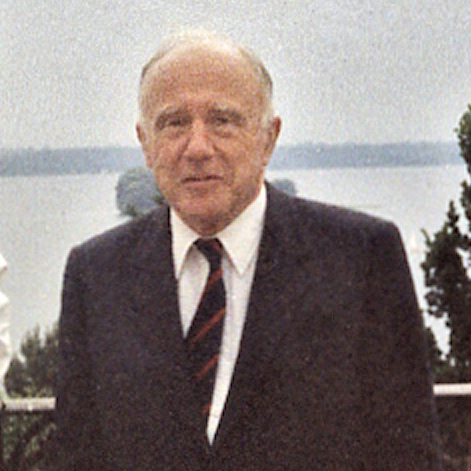Obras
Geons
John Archibald WheelerFrases célebres de John Archibald Wheeler
“El tiempo es lo que evita que todo suceda a la vez.”
Wheeler citó este dicho en Complexity, Entropy, and the Physics of Information, p. 10 http://books.google.com/books?id=mdjsOeTgatsC&lpg=PP1&pg=PA10#v=onepage&q&f=false, con una nota a pie de página atribuyéndola a un "grafiti en el servicio de hombres del café The Pecan Street Cafe, en Austin, Texas". Publicaciones más tardías, como en 1995 el libro de Paul Davies, About Time (p. 236), atribuyeron a Wheeler variaciones de esta frase, aunque el dicho es en realidad mucho más antiguo. La fuente más antigua conocida es de 1922; en la novela de ciencia ficción de Ray Cummings, The Girl in the Golden Atom, http://www.gutenberg.org/ebooks/21094: " 'Time,' he said, 'is what keeps everything from happening at once.' Según Science-Fiction: The Early Years, de Everett F. Bleiler, p. 171 http://books.google.com/books?id=KEZxhkG5eikC&pg=PA171, la novela fue una composición de dos historias anteriores publicadas en 1919 y 1920. También aparece en su novela de 1929, The Man Who Mastered Time http://books.google.com/books?id=YdZEAAAAYAAJ&q=%22everything+from+happening+at+once%22#search_anchor. Aparte de la de Cummings, la aparición más temprana es de 1962, en Film Facts: Volume 5, p. 48 http://books.google.com/books?id=sr0vAQAAIAAJ&q=%22everything+from+happening+at+once%22.
Atribuida erróneamente
Fuente: Geons, Black Holes, and Quantum Foam: A Life in Physics p. 153 http://books.google.es/books?id=zGFkK2tTXPsC&lpg=PA1&hl=es&pg=PA153#v=onepage&q&f=false.
Fuente: Scientific American (1992), Vol. 267.
John Archibald Wheeler: Frases en inglés
John Archibald Wheeler, in "Albert Einstein in Biographical Memoirs Vol. 51, by the National Academy of Sciences
As quoted by Amanda Gefter (from the symposium in honor of Wheeler's 90th birthday) [Trespassing on Einstein's lawn: a father, a daughter, the meaning of nothing, and the beginning of everything, 2014, https://books.google.com/books?id=NUMkAAAAQBAJ]
As quoted in by Ken Wilber in Quantum Questions: Mystical Writings of the World's Great Physicists (2001) Shambhala, ISBN 1570627681.
[John Archibald Wheeler, Kenneth William Ford, Geons, Black Holes, and Quantum Foam: A Life in Physics, W. W. Norton & Company, 2000, 0393319911, 153]
“Spacetime tells matter how to move; matter tells spacetime how to curve.”
Wheeler's succinct summary of Einstein's theory of general relativity, in Geons, Black Holes, and Quantum Foam (2000), p. 235. http://books.google.com/books?id=zGFkK2tTXPsC&lpg=PA1&pg=PA235
As quoted by Paul Davies, Other Worlds (1980)
"The Anthropic Universe" http://www.abc.net.au/radionational/programs/scienceshow/the-anthropic-universe/3302686 (Feb 18, 2006) Australia's Science Show, with Martin Redfern moderating excerpts from several scientists, including Wheeler. Audio recording http://mpegmedia.abc.net.au/rn/podcast/2006/02/ssw_20060218_1200.mp3 and transcript available. See also same show at WayBack Machine, https://web.archive.org/web/20080616183602/http://www.abc.net.au/rn/science/ss/stories/s1572643.htm Internet archive.org.
“… we can afford many mistakes in the search. The main thing is to make as fast as possible.”
As quoted by Charles W. Misner, Kip S. Thorne, and Wojciech H. Zurek. "John Wheeler, relativity, and quantum information." https://authors.library.caltech.edu/15184/1/Misner2009p1638Phys_Today.pdf Physics Today 62, no. 4 (April 2009): 40–46 (quote from p. 44) [10.1063/1.3120895]
"Information, Physics, Quantum: The Search for Links" in Complexity, Entropy and the Physics of Information (1990) ed., Wojciech H. Zurek, p. 5. http://books.google.com/books?id=mdjsOeTgatsC&lpg=PP1&pg=PA5
“Time is nature's way to keep everything from happening all at once.”
Wheeler quoted this saying in Complexity, Entropy, and the Physics of Information (1990), p. 10 http://books.google.com/books?id=mdjsOeTgatsC&lpg=PP1&pg=PA10#v=onepage&q&f=false, with a footnote attributing it to "graffiti in the men's room of the Pecan Street Cafe, Austin, Texas". Later publications, such as Paul Davies' 1995 book About Time (p. 236), credited Wheeler with variations of this saying, but the quip is actually much older. The earliest known source is Ray Cummings' 1922 science fiction novel The Girl in the Golden Atom, http://www.gutenberg.org/ebooks/21094 Ch. V: " 'Time,' he said, 'is what keeps everything from happening at once.' " It also appears in his 1929 novel The Man Who Mastered Time. http://books.google.com/books?id=YdZEAAAAYAAJ&q=%22everything+from+happening+at+once%22#search_anchor The earliest known occurrence other than Cummings is from 1962 in Film Facts: Volume 5, p. 48 http://books.google.com/books?id=sr0vAQAAIAAJ&q=%22everything+from+happening+at+once%22.
Misattributed
"Albert Einstein" in Biographical Memoirs (1980) Vol. 51, National Academy of Sciences.
"Hermann Weyl and the Unity of Knowledge" http://www.weylmann.com/wheeler.shtml, American Scientist (July-August 1986) Vol. 74, pp. 366-375. Reprinted in At Home in the Universe (1993), p. 171. http://books.google.com/books?id=w9BXAAAAYAAJ&q=%22hermann+weyl+and+the+unity+of+knowledge%22#search_anchor
from a transcript of the video interview "Understanding Relativity," published at webofstories.com
